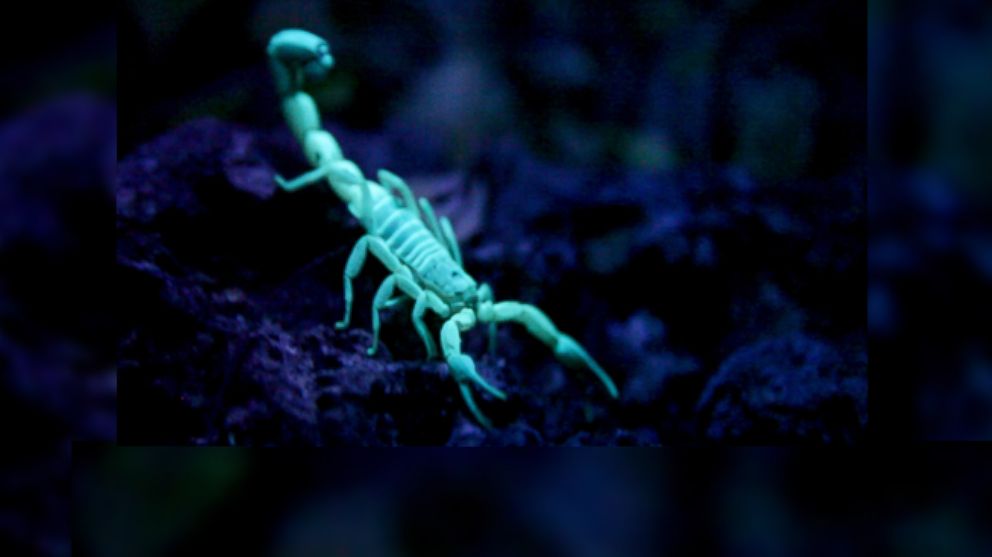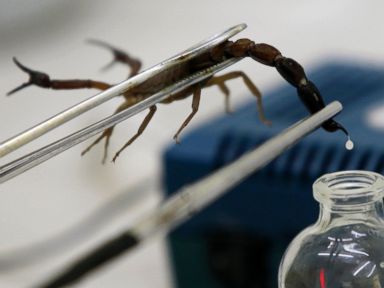
A Dominican Republic-based company is making the controversial claim that its scorpion venom drug can help fight cancer, but some oncologists in the United States warn it may provide nothing more than a stiff dose of false hope.
Russian émigré Dr. Arthur Mikaelian and his company, Medolife, produce a drug called Escozine, whose sole active ingredient is blue scorpion venom. Medolife said Escozine is an effective cancer treatment because a peptide in the venom called chlorotoxin — the same chemical that paralyzes prey — also happens to target and kill cancer cells.
Despite the fact that the unproven drug is not approved by the U.S. Food and Drug Administration, thousands of desperate Americans are betting their lives on it.
Watch the full story on “Nightline” TONIGHT at 12:35 a.m. ET, in which ABC’s Matt Gutman travels to Medolife’s scorpion reservation in the Dominican Republic.

Dr. Len Lichtenfeld, the deputy medical director of the American Cancer Society, is skeptical of the cancer-curing properties of Escozine and cautioned against patients substituting alternative medicines for traditional cancer treatments, such as radiation and chemotherapy.
“There’s no reasonable scientific evidence to show that this drug works in treating patients with cancer,” Lichtenfeld said.
He said he has seen too many claims about alternative medicines, such as scorpion venom, that turn out not to work and leave patients in despair.
“Cancer patients have enough to deal with,” he said. “To have to deal with unverified, undocumented hope is a burden that no one should have to bear.”
Peggy Howe is one of those people who swear by Escozine. The Kansas grandmother said she was diagnosed with stage-four breast cancer in 2011. Despite heavy chemotherapy and radiation, Howe’s cancer spread to her liver and lungs. She said doctors told her and her husband Larry that she had just two months to live.
“We started making funeral arrangements, but I wasn’t ready to die,” Howe said.
As a last-ditch effort, Howe started taking Escozine. Without FDA approval, Escozine cannot be not sold in U.S. stores, but can be purchased online through Medolife’s website.
“Within four days, I was starting to have more energy and then within six months it was gone,” she said.
She also apparently took guidance from the company’s website, and its “Escozine Success Calculator,” which gave her a 76 percent chance of success, she wrote on a cancer survivor message board.
However, the medical records that Howe provided to ABC News don’t indicate when Howe stopped or started taking Escozine, and therefore could not prove that Escozine affected her health. So did scorpion venom make her cancer go away?
Escozine isn’t the first natural remedy purported to cure diseases. Some have turned out to have significant medicinal value. Lichtenfeld said the first chemotherapy drugs came from the bark of the Pacific yew tree, which were first used as folk medicines in China. But most of these remedies, such as snake oil and rhino horn, have been resoundingly debunked.
But Mikaelian and his partner Sebastian Serrel Watts attribute to Escozine almost miraculous powers. In addition to attacking cancer cells, Medolife says that scorpion venom might also combat auto-immune diseases, everything from HIV to hepatitis, and even male impotence.
When asked why large pharmaceutical companies, which spend billions of dollars on cancer research each year, haven’t marketed scorpion venom, Mikaelin said, pharmaceutical companies don’t study “natural compounds because you can’t patent [a] natural product.”
Medolife breeds a giant colony of scorpions — 83,000 strong – at a scorpion reservation in the Dominican Republic. Turn over any rock, or peer down a bamboo segment designated as the scorpion’s home, and you’ll find a scorpion about as long as a credit card.
The scorpion’s venom is extracted in a modest rented lab in Santo Domingo. Each scorpion yields only five to seven drops of venom a month, and only a tiny amount is inserted into small bottles, which go for $ 700 each, a month’s supply for the average customer.
Although he said he is “more than convinced” his drug can fight cancer, Mikaelian agreed that the drug needs significantly more testing.
“We never use ‘cure cancer,’” he said.
“To ‘fight, fight cancer,’” Watts added. “Obviously we want to help the maximum ability that this medicine can possibly help. It’s a natural product, if we can take it to the absolute maximum to help and if we can eradicate those cancer cells in as many people as we can, that is our goal.”
But on its website, Medolife said Escozine is a “natural medicine approved and certified for oncological treatments.” It is only when you click on the word “certified” that you find out it received this approval not in the United States but in the Dominican Republic.
“We’re also registered in Russia, Belarus, Kasazkstan and Vietnam,” Watts said.
The company’s website has an “Escozine Success Calculator,” offering its users the probability of remissions. But every scenario ABC News plugged in, including cases of the most severe forms of cancer, the calculator still promised some possibility of “major results.”
When ABC News alerted Medolife that its website might violate FDA regulations against marketing drugs on the Internet without FDA approval, the company conceded it was rapidly making changes to its website.
But the more important issue was that Medolife could not produce a single peer-reviewed study showing that Escozine works.
In the company’s eight-year clinical study, which enrolled 8,302 cancer patients with varying disease type and severity, Escozine was found to have a near 90 percent success rate in improving quality of life, which included everything from decreased pain to increased survival rates. But the company acknowledged that the study was not peer-reviewed, and the results of their trial are not accepted by the American standards of science.
It is one reason several American doctors say they warn patients to be wary of unproven remedies.
“You never say never. You never say that something can’t possibly work, that it would never work,” Lichtenfeld said. “We’ve all seen situations where we have jumped to conclusions too early, but unfortunately, many more times than not, the original claims for drugs like this don’t work out.”
But Howe continues to swear by the treatment and even got a scorpion tattoo on her ankle. She also said her cancer returned after she stopped taking Escozine and was now putting her faith once again into scorpion venom, hoping it would save her life.
//Random Articles
YOUR COMMENT